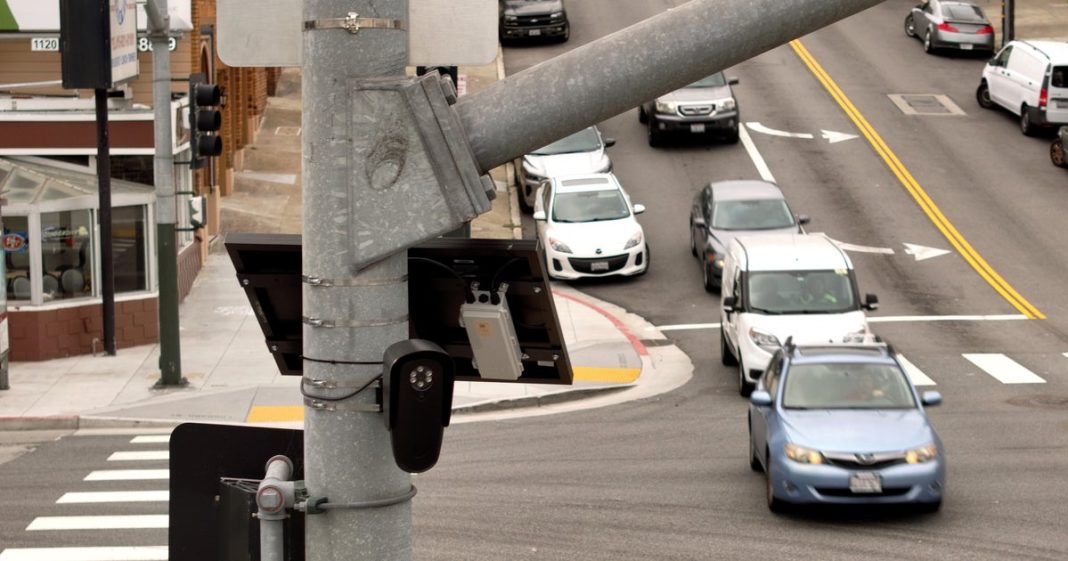
In 2018, Brian Hofer and his younger brother were driving to visit their parents for Thanksgiving. It should have been a routine trip.
But that evening they found themselves held at gunpoint by a group of law enforcement officers.
The incident was the result of technology gone wrong. Hofer’s vehicle had been flagged as stolen by an Automated License Plate Reader — ALPR — system. When he drove by, the reader alerted authorities.
“Your life definitely is different after you have guns pointed at you,” he said.
This incident is one of over a dozen cases verified by CBS News during a six-month investigation into incidents of wrongful stops and even several instances of ALPR technology being abused.
The consequences of ALPR errors can range from the inconvenient — such as mistaken toll booth charges — to the potentially dangerous, such as Hofer’s armed detainment. In some instances the technology was improperly used by authorities, such as in Kansas, where law enforcement officers used license plate reader systems to stalk former partners in two separate incidents.
The rise of ALPR systems
In use since at least the late 1990s, automated license plate reader systems have advanced quickly in recent years. They now marry high-speed, high-resolution cameras with artificial intelligence to scan every license plate passing through a designated field of vision. The data is then compared against license plate numbers in databases.
Thousands of agencies use these systems daily to scan plates in real time and identify potential matches. Departments use ALPRs as a crime-fighting tool to gather evidence for investigations and reduce crime as well as for traffic compliance.
According to a survey from the Bureau of Justice Statistics, every police department overseeing more than one million citizens reported using the technology, as did 90% of sheriff’s offices with 500 or more sworn deputies.
Law enforcement officials told CBS News that the technology has allowed them to do their job more efficiently and has helped solve crimes ranging from stolen vehicles to missing persons cases.
Pat Yoes, the national president of The National Fraternal Order of Police, an organization of hundreds of thousands of sworn law enforcement officers, said in an emailed statement to CBS News that ALPRs are “extraordinarily important in cases where there is an immediate threat to life or safety, as in an abduction or an armed threat driving to a target,” adding that the information can be valuable in generating leads and closing cases.
He said transparency is key. “The community should be made aware of the new technology, how it’s used in the field, how it contributes to public safety, and how it addresses any privacy concerns,” he said in the statement. “Technology like ALPRs is a valuable tool for many law enforcement agencies to make their communities safer.”
The rise of ALPR systems comes as law enforcement agencies across the country face staffing and recruiting challenges. A 2024 survey by the International Association of Chiefs of Police, a professional association, found that U.S. agencies are operating at a nearly 10% staffing deficit. ALPR technology is one way to help fill this gap in manpower.
Why license plate readers make errors — what we found
License plate reader errors may occur for a variety of reasons. In some cases, letters or numbers are interpreted incorrectly by the Optical Character Recognition, or OCR, software. According to the National Highway Traffic Safety Administration, common issues including glare or misaligned cameras could impact accuracy. CBS News found that mistakes are often due to a mix of machine and human or administrative errors.
In Española, New Mexico, a 12-year-old was handcuffed after an ALPR camera misread the last number of a license plate on a vehicle driven by her older sister as a ‘7’ instead of the ‘2’ it actually ended with, according to a lawsuit filed against the city. A month later, in a separate incident, a 17-year-old honors student was held at gunpoint in Española on his way home from school after officers mistook his vehicle for one associated with an individual who was being sought in connection with a string of armed robberies.
In Aurora, Colorado, in 2020, a mother and her family, including her 6-year-old daughter, were pulled over at gunpoint and forced to lie face down on hot pavement. Again, ALPR technology was central to the stop. Police mistakenly flagged their Colorado license plate as matching that of a completely different vehicle from a different state — a stolen motorcycle registered in Montana. The incident, captured on video and widely condemned, led to a $1.9 million settlement from the city in 2024.
Privacy and accuracy concerns
The ACLU warns ALPR cameras could infringe on civil rights and violate the Constitution’s Fourth Amendment by encouraging unreasonable searches. Despite widespread use, there is no federal legislative framework for ALPR use.
Hofer, who has been involved in privacy advocacy for over a decade, is now the executive director of Secure Justice, an organization that aims to reduce government and corporate overreach. He says manual verification is necessary to see whether ALPR “hits,” or matches, are accurate. Even so, he said, such checks are insufficient because data errors could cause a plate to “match” an incorrect entry in a database.
“There are billions of scans a day in America. If there’s even just a 10% error rate, that means there are so many opportunities for abuse to happen,” Hofer said.
Some concerned citizens are taking action. Last year, residents of Norfolk, Virginia, filed a federal lawsuit against the city, and in Illinois, two residents have sued the Illinois State Police over ALPR systems, arguing that their use violates Fourth Amendment rights. The latter case was dismissed without prejudice in April.
Source link




